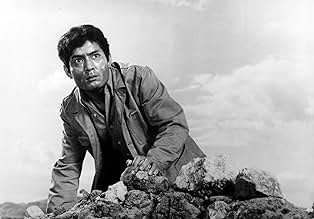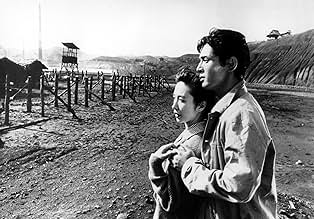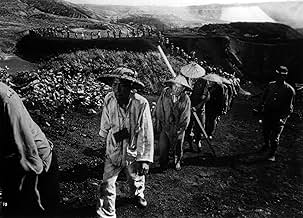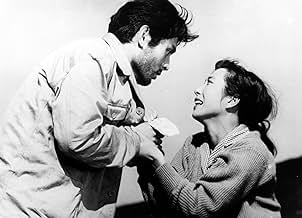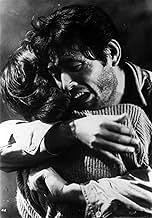A Japanese pacifist, unable to face the dire consequences of conscientious objection, is transformed by his attempts to compromise with the demands of war-time Japan.A Japanese pacifist, unable to face the dire consequences of conscientious objection, is transformed by his attempts to compromise with the demands of war-time Japan.A Japanese pacifist, unable to face the dire consequences of conscientious objection, is transformed by his attempts to compromise with the demands of war-time Japan.
- Awards
- 5 wins & 1 nomination
- Kô
- (as Shinji Nanbara)
- Director
- Writers
- All cast & crew
- Production, box office & more at IMDbPro
Storyline
Did you know
- TriviaAccording to Tatsuya Nakadai, a marathon screening of the entire nine-and-a-half-hour "Human Condition" trilogy is held once a year in Japan, and he has once or twice attended these screenings, which are always sold out.
- GoofsAt one point a Japanese guard begins to whip Kao, yet the motions he makes are just a flailing of his arms, visibly missing the actor. Kao retaliates by throwing a rock at the guard, but the rock never strikes the guard. However, the actor playing the guard overreacts as if he has been struck.
- Quotes
Kaji: [discussing the pardoning of prisoners due to be executed for an alleged escape attempt] I'll be honest. There's only one chance in one hundred.
Kyôritsu Ô: This does not concern us alone. Just as my companions stand between life and death, so do you now stand at an important crossroads.
Kaji: You're right.
Kyôritsu Ô: If you fail now, no one will ever trust you again, and you too will lose faith in yourself.
Kaji: It's true.
Kyôritsu Ô: Yet you would do nothing?
Kaji: What can I do?
Kyôritsu Ô: Must a man outside this barbed wire ask me such a question? Not all the Japanese working here are murderous devils. Their combined opinion objecting to this execution will be more effective than one individual alone.
Kaji: If I'd always acted as you wanted me to there'd be no Kaji here today. I'd like to see what you'd do in my position.
Kyôritsu Ô: You and I will both make minor mistakes. Such things can be forgiven. But an error made at a crucial moment is an unforgivable crime. Your life has been a series of errors stemming from the conflict between your work and yourself. Such errors can possibly be corrected. But this one cannot.
Kaji: Meaning?
Kyôritsu Ô: You'll either be revealed as a murderer wearing the mask of humanism or as one worthy of the beautiful name... "man".
- ConnectionsFollowed by The Human Condition II: Road to Eternity (1959)
Kaji is also confronted with the another irony. Although he opposes the war, he has chosen a route of avoidance rather than resistance. This is emphasized early in the film during an evening with a friend who is about to be inducted. His friend comments that, although they opposed the war, neither of them was brave enough to face the penalty for resistance of life imprisonment. Shortly thereafter, he takes the mine job to get a military exemption. Yet, if he is successful, the production improvements in the mine only fuel the Japanese war machine.
A valuable film because it explores areas of the pacific war that are not well know in the west. Also an interesting observation in the danger of half-measures when taking a moral stance. Kaji is ultimately confronted with the fact that you cannot avoid the war, only oppose it or aid it. I look forward to viewing the next film.
- How long is The Human Condition I: No Greater Love?Powered by Alexa
Details
- Release date
- Country of origin
- Languages
- Also known as
- Human Condition I: No Greater Love
- Filming locations
- Hokkaido, Japan(Exterior scenes of the Manchurian mine)
- Production companies
- See more company credits at IMDbPro
- Runtime3 hours 28 minutes
- Color
- Sound mix
- Aspect ratio
- 2.35 : 1
Contribute to this page



